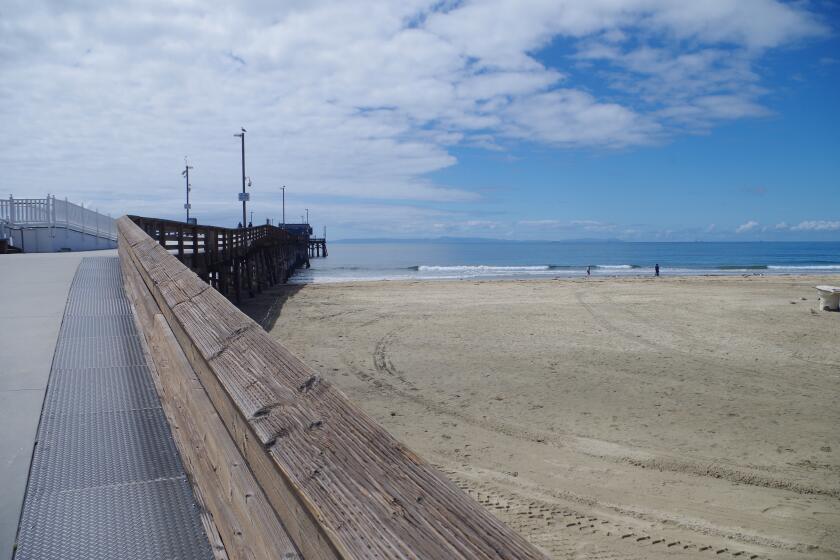Time to address global warming
- Share via
Looking at the big picture this Thanksgiving.
As we sit down to a luscious turkey dinner with all the trimmings and give thanks for our many blessings in our safe and secure homes, let’s not forget about the biggest threat that civilization has ever faced: global warming.
The onset of global warming has been subtle, and hard to detect among the ups and downs of normal weather fluctuations. But it’s all around us. We saw the effects of global warming in this past season’s record hurricanes. We saw it when record high tides topped a berm near Warner Avenue at Bolsa Chica last winter and poured ocean water into a restored wetland cell that had previously been flushed only through a drain pipe.
We see the effects of global warming in the unseasonably long hot spell that we’ve had here the past few weeks. We see it in the off-season courting behavior of birds at the Bolsa Chica and Seal Beach National Wildlife Refuge. We see it in the starving sea birds brought into the Wetlands and Wildlife Care Center. Food in the arctic has run low again this year. Many birds failed to mate this summer. The survivors are struggling south, some of them washing up on beaches.
Temperatures at the north and south poles are rising to the point that ice sheets and glaciers are melting. But until recently, meteorologists believed that temperatures in the tropics were staying fairly constant. That didn’t make sense. Finally, someone had the presence of mind to check the satellites that were collecting the data. The satellites had gotten out of sync and were collecting temperatures at night and reporting them as daytime temperatures. What a difference that makes. It’s a fact. The whole planet is heating up.
At this point, we can’t imagine that there is anyone left who doesn’t recognize that global warming is real. Scientists recognize that burning fossil fuel puts additional carbon dioxide into the atmosphere, increasing the greenhouse effect. The scientific community is now widely in agreement that it is the actions of humans that are responsible for this current warming of the planet. Scientists recognize that even a minor shift in global temperatures can cause major shifts in ecosystems and crop failures on farms around the world.
Nothing less than stability of human civilization is at stake. So why isn’t anyone doing anything?
The answer, of course, is that people are doing something. Some people anyway. There were 141 countries that signed the Kyoto Protocol that calls for reducing greenhouse gas emissions. Unfortunately, the United States isn’t one of those countries, in part because we have an anti-science president and in part because we have an administration that wants to promote rather than curtail the burning of fossil fuels.
The Kyoto Protocol took effect Feb. 16, 2005, for the 141 countries that signed it. They are making an effort to reduce greenhouse gas emissions. The U.S., which is the world’s biggest polluter, is not. At least not at the federal level. On the same day that the Kyoto Protocol took effect, Seattle Mayor Greg Nickels announced that his city was taking action on its own.
Mayor Nickels urged other mayors to join him in committing to three actions. The first step is striving to meet or beat the Kyoto Protocol targets in their own communities, through actions including anti-sprawl land-use policies, planting urban forests and information campaigns to encourage energy conservation.
The second step is urging state and federal governments to enact policies and programs to meet or beat the greenhouse gas emission reduction target suggested for the United States in the Kyoto Protocol. That means a 7% reduction from 1990 emission levels by 2012. The final step is to urge Congress to pass bipartisan greenhouse gas reduction legislation that would establish a national emission-trading system.
As of Nov. 9, mayors of 187 cities from 38 states have joined Seattle by signing the US Mayors Climate Protection Agreement. These cities represent 40 million people. Huntington Beach ought to be among them.
In a city with a charter like ours, Mayor Jill Hardy could sign this agreement on our behalf, but the level of commitment for our city would be vastly greater if it were endorsed by vote of the City Council. We hope that Mayor Hardy will bring this matter up for action by the council. If the council does not vote to join the agreement, we hope that Mayor Hardy will sign for herself.
We already have an urban forest, and the Huntington Beach Tree Society is making a heroic effort to plant even more trees. Those trees help take carbon dioxide out of the atmosphere. Each tree can absorb a ton of carbon dioxide, but we each generate a thousand tons of carbon dioxide in our lifetime.
There is so much more that we could be doing to conserve fossil fuels and thereby reduce emissions of carbon dioxide. Visit www.stopglobalwarming.org to see how you can participate in saving our planet.20051124gzerw1ke(LA)
All the latest on Orange County from Orange County.
Get our free TimesOC newsletter.
You may occasionally receive promotional content from the Daily Pilot.



